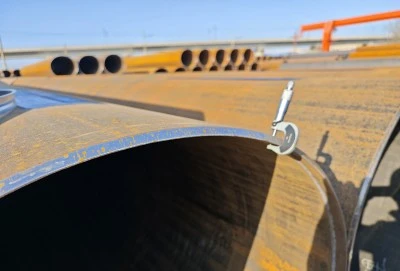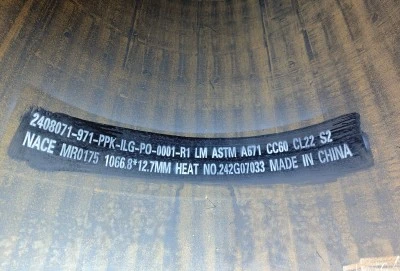Carbon steel pipes are widely used in various industries due to their strength, durability, and cost-effectiveness. However, like all metals, carbon steel is susceptible to corrosion, which can significantly impact the performance and longevity of these pipes. In this comprehensive guide, we'll explore the causes of corrosion in carbon pipes, the various forms it can take, and effective prevention and control measures to protect your piping systems.
|
|
|
Causes of Corrosion in Carbon Steel Pipes
Corrosion in carbon steel pipes is a complex process influenced by several factors. Understanding these causes is crucial for implementing effective prevention strategies:
1. Environmental Factors
The environment in which carbon steel pipes are installed plays a significant role in corrosion. Exposure to moisture, oxygen, and corrosive chemicals can accelerate the corrosion process. For example, pipes installed in coastal areas are more prone to corrosion due to the high salt content in the air and water.
2. Temperature Fluctuations
Extreme temperature changes can cause thermal expansion and contraction of carbon pipes, leading to stress and potential cracking. This can create weak points where corrosion can initiate and spread more rapidly.
3. Microbial Activity
Certain bacteria can contribute to corrosion through a process called microbiologically influenced corrosion (MIC). These microorganisms can produce corrosive byproducts or create conditions that accelerate the corrosion of carbon steel pipes.
4. Galvanic Corrosion
When carbon pipes come into contact with more noble metals in the presence of an electrolyte, galvanic corrosion can occur. This type of corrosion is particularly common in systems where different metals are joined together.
5. Flow-Induced Corrosion
High-velocity fluid flow within carbon steel pipes can lead to erosion-corrosion, where the protective oxide layer is continuously removed, exposing fresh metal to corrosive elements.
Forms of Corrosion in Carbon Steel Pipes
Corrosion in carbon steel pipes can manifest in various forms, each with its unique characteristics and challenges:
1. Uniform Corrosion
This is the most common form of corrosion, characterized by an even loss of metal across the surface of the carbon steel pipe. While it's generally predictable, it can lead to significant thinning of pipe walls over time.
2. Pitting Corrosion
Pitting corrosion creates localized areas of deep penetration in carbon pipes. It's particularly dangerous as it can lead to pipe failure with little visible surface damage.
3. Crevice Corrosion
This form of corrosion occurs in narrow gaps or crevices where water can stagnate, creating a corrosive microenvironment. It's common in joints and under deposits in carbon steel pipes.
4. Stress Corrosion Cracking (SCC)
SCC is a result of the combined action of tensile stress and a corrosive environment. It can lead to sudden and catastrophic failure of carbon pipes without warning.
5. Intergranular Corrosion
This type of corrosion attacks the grain boundaries of carbon steel, leading to a loss of strength and ductility. It's often associated with improper heat treatment or welding processes.
Prevention and Control Measures for Carbon Steel Pipe Corrosion
Protecting carbon steel pipes from corrosion is essential for maintaining the integrity and longevity of piping systems. Here are some effective prevention and control measures:
1. Protective Coatings
Applying protective coatings is one of the most effective ways to prevent corrosion in carbon steel pipes. Epoxy coatings, for example, create a barrier between the pipe surface and corrosive elements. For enhanced protection, consider using PE (Polyethylene) coated carbon pipes, which offer excellent resistance to both internal and external corrosion.
2. Cathodic Protection
Cathodic protection involves applying a small electrical current to the carbon steel pipe to prevent corrosion. This can be achieved through sacrificial anodes or impressed current systems, effectively protecting large pipeline networks.
3. Material Selection
Choosing the right grade of carbon steel for your specific application can significantly impact corrosion resistance. For instance, API carbon steel pipes are designed to meet stringent industry standards and offer improved corrosion resistance for oil and gas applications.
4. Environmental Control
Controlling the environment around carbon pipes can help prevent corrosion. This may include reducing humidity, controlling temperature, or removing corrosive substances from the surrounding area.
5. Regular Inspection and Maintenance
Implementing a regular inspection and maintenance program can help identify and address corrosion issues early. This may include non-destructive testing techniques and scheduled cleaning of carbon steel pipes.
6. Chemical Treatments
Adding corrosion inhibitors to the fluid flowing through carbon pipes can help prevent internal corrosion. These chemicals form a protective film on the pipe surface, reducing contact with corrosive elements.
7. Design Considerations
Proper design of piping systems can minimize areas where corrosion is likely to occur. This includes avoiding sharp bends, ensuring proper drainage, and minimizing areas where water can stagnate.
Longma Group
In conclusion, while carbon steel pipes are susceptible to corrosion, understanding the causes and forms of corrosion, along with implementing effective prevention measures, can significantly extend their service life. By choosing high-quality products like API carbon steel pipes and considering protective measures such as PE coatings, you can ensure the longevity and reliability of your piping systems.
Don't miss out on the opportunity to enhance your pipeline projects with Longma Group's top-notch carbon steel pipes. We offer a comprehensive range of grades, including B, X42, X46, X52, X56, X60, X65, X70, and X80, catering to diverse industry needs. Our pipes are available in both PSL1 and PSL2 levels, with outer diameters ranging from 1/8" to 80" and thicknesses from SCH10 to SCH160, ensuring you find the perfect fit for your requirements. Trust in our expertise backed by prestigious certifications, including the API 5L Certificate, ISO Certificate, and QMS Certificate. Contact us now at info@longma-group.com to discuss your needs and experience the Longma Group difference. Let's build a corrosion-resistant future together with our high-quality PE coated steel pipes.














